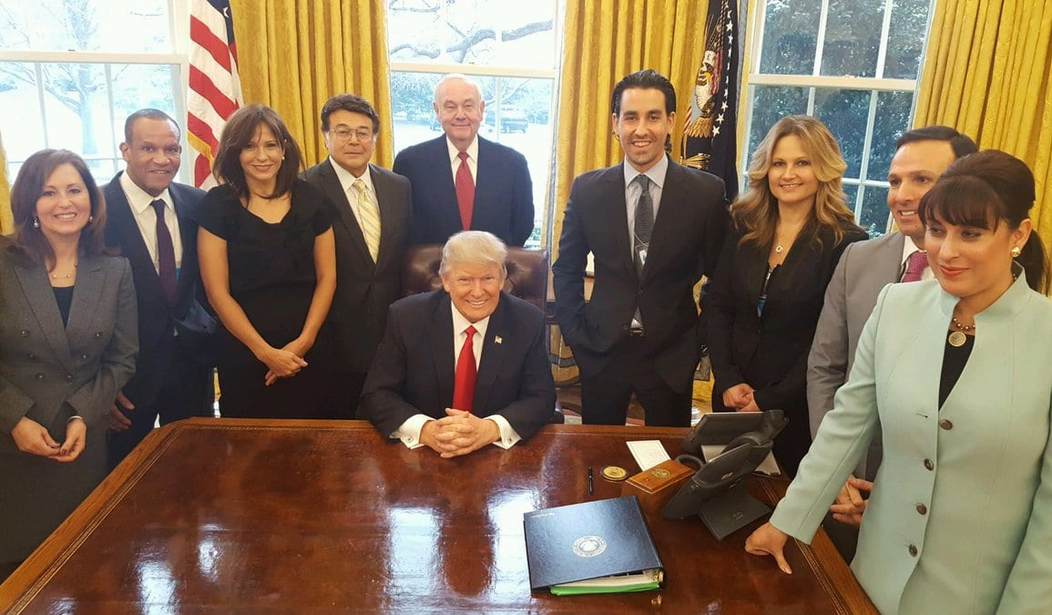On Monday, President Donald Trump signed an executive order mandating that for every new regulation issued by any executive agency, two regulations must be eliminated, offsetting the cost of any new regulation to “zero.”
“This will be the biggest such act that our country has ever seen,” the president declared right before signing the order. “There will be regulation and control,” he promised, “but it will be normalized control where you can open your business and expand your business very easily, and that’s what our country has been about.”
Trump signed the order in front of a group of small business owners, following a listening session beforehand.
The American dream is back. We’re going to create an environment for small business like we haven’t had in many, many decades! pic.twitter.com/ZuJNaN6z8b
— Donald J. Trump (@realDonaldTrump) January 30, 2017
To a small-government conservative, the order sounds too good to be true. It explicitly states that “it is important that for every one new regulation issued, at least two prior regulations be identified for elimination, and that the cost of planned regulations be prudently managed and controlled through a budgeting process.”
Trump’s order declares that “for fiscal year 2017 … the heads of all agencies are directed that the total incremental cost of all new regulations, including repealed regulations, to be finalized this year shall be no greater than zero, unless otherwise required by law or consistent with advice provided in writing by the Director of the Office of Management and Budget” (OMB) (emphasis added).
If applied faithfully, this order would effectively prevent any new regulatory burden on the American economy for the foreseeable future. There will be new regulations, but the economic cost of each new rule must be offset by the costs saved to the economy by the elimination of two previous regulations.
This is fundamentally important because, as Florida Congressman Ron DeSantis pointed out in September of last year, it is likely the average American family actually pays more money in hidden costs due to regulations than in direct taxes.
“I’ve seen some pretty credible analysis that suggests that the cost of indirect taxes through bureaucracy, through regulatory policy, through red tape, actually imposes a greater total burden on the average American family than what the government’s imposing on you through direct taxes,” DeSantis argued.
When the government subsidizes ethanol or mandates a certain percentage in oil, for example, it helps some farmers and lobbyists, but harms everyone else. DeSantis estimated that “the cumulative effect for the economy from having our regulatory leviathan” works out to a cost of $1.8 trillion. This is “roughly equivalent to how much money the government collects in personal and corporate income taxes,” the congressman said.
By halting any incremental costs from new regulation, Trump’s order holds that economic burden steady. This is a welcome change, but it would be even better if he could cut the burden of regulations overall. If Trump’s administration achieves this higher goal, the incremental cost of regulations would not just be “no greater than zero,” but far less than zero.
The president also explained how his executive order would work.
If you have a regulation you want, No. 1, we’re not going to approve it because it’s already been approved — probably in 17 different forms. But if we do, the only way you have a chance is we have to knock out two regulations for every new regulation. So if there’s a new regulation, they have to knock out two.
President Trump signs an executive order cutting government regulations on small and large businesses. pic.twitter.com/t4Eec9rJah
— CSPAN (@cspan) January 30, 2017
House Speaker Paul Ryan praised the order in a statement Monday afternoon, arguing that it builds on House Republicans’ “Better Way” agenda. He also said it is a foretaste of the Obama-era regulations Congress is set to repeal this coming week.
“The explosion of federal regulations has hamstrung small business growth and crippled our economy,” Ryan declared. “President Trump’s executive order helps bring the nation’s regulatory regime into the 21st century by putting regulators on a budget, and addressing the costs agencies can impose each year.”
In a statement from the Roosevelt Room before Trump signed the order, the president promised that “we’ll be reducing [federal regulations] big league and their damaging effects on our small businesses, our economy, our entrepreneurial spirit. And it’s been very badly damaged. So the American dream is back.”
Trump promised small-business leaders that he would “create an environment for small business like we haven’t had in many, many decades,” Politico reported. The president also noted that “it’s almost impossible now to start a small business. And it’s virtually impossible to expand your existing business because of regulations.”
Nevertheless, Trump added that he was not singling out his predecessor, President Obama, in this effort to curb federal regulations. “It’s a knock on everybody,” when it comes to presidents, Trump said. Indeed, few presidents since Calvin Coolidge have drastically cut the size and scope of the federal bureaucracy.
Trump’s order, while a huge step forward, explicitly exempted “regulations issued with respect to a military, national security, or foreign affairs function of the United States,” as well as regulations “related to agency organization, management, or personnel.” It also gave broad discretion to the director of the OMB to choose which other types of regulations should be exempted.
Despite these caveats, Trump’s executive order on regulations is a tremendous victory for small-government conservatives and to anyone worried about the huge economic costs of America’s sprawling federal regulations. Luckily, it also seems to have received scant attention in the national press, due to the issue of Trump’s immigration order and his upcoming Supreme Court nomination.
While those are important issues, this regulatory coups d’état is a tremendous victory, and deserves to be celebrated.









Join the conversation as a VIP Member